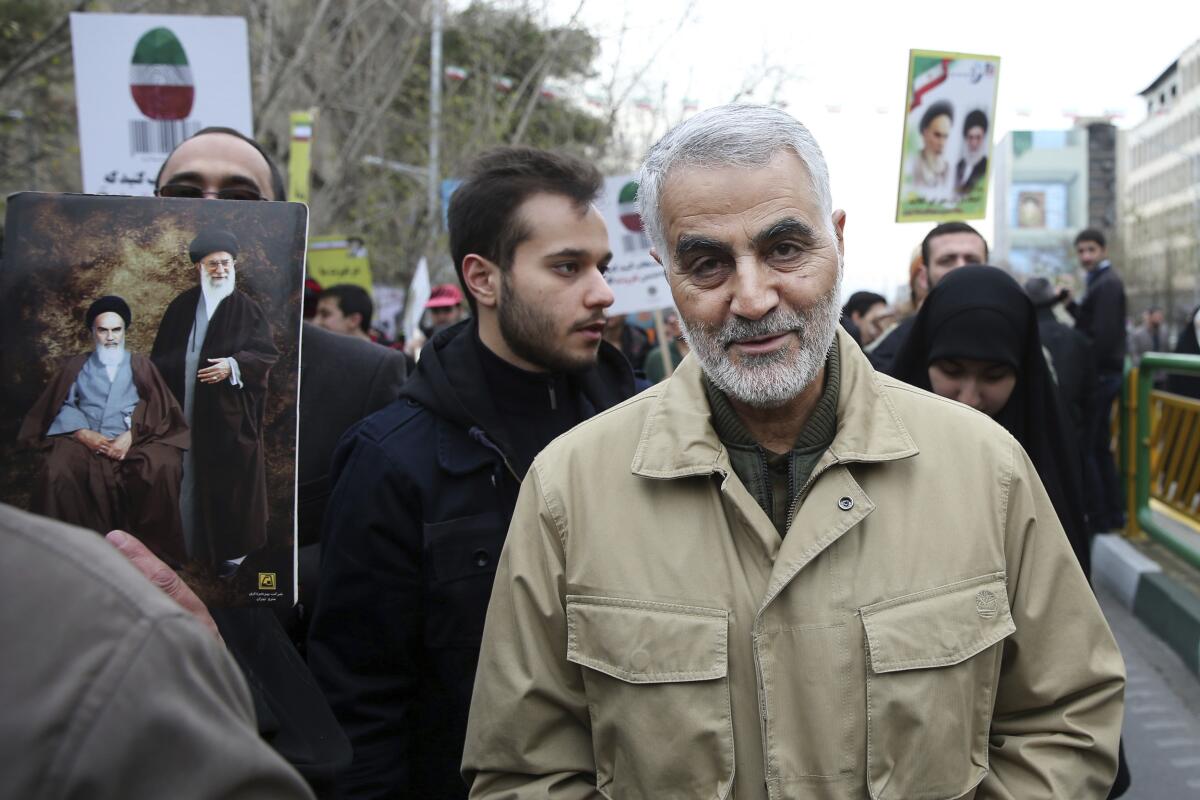Iran’s Gen. Qassem Suleimani killed in U.S. airstrike at Baghdad airport, Pentagon confirms

- Share via
BAGHDAD — Gen. Qassem Suleimani, the head of Iran’s elite Quds Force, was killed in a U.S. airstrike at Baghdad’s international airport Friday, the Pentagon confirmed.
“At the direction of the President, the U.S. military has taken decisive defensive action to protect U.S. personnel abroad by killing [Qassem Suleimani], the head of the Iranian Revolutionary Guard Corps-Quds Force, a U.S.-designated Foreign Terrorist Organization,” according to a statement.
The Pentagon said that Suleimani “was actively developing plans to attack American diplomats and service members in Iraq and throughout the region.”
President Trump did not have an immediate comment apart from tweeting an image of the U.S. flag.
The strike also killed Abu Mahdi Muhandis, the deputy commander of Iran-backed militias known as the Popular Mobilization Forces, or PMF, the officials said.
Their deaths are a potential turning point in the Middle East and are expected to draw severe retaliation from Iran and the forces it backs in the Middle East against Israel and American interests.
The Popular Mobilization Forces blamed the United States for the attack.
A senior Iraqi politician and a high-level security official confirmed to the Associated Press that Suleimani and Muhandis were among those killed in the attack. Two militia leaders loyal to Iran also confirmed the deaths, including an official with the Kataib Hezbollah, which was involved in an attack on the U.S. Embassy this week.
The official, speaking on condition of anonymity, said Muhandis had arrived to the airport in a convoy to receive Suleimani whose plane had arrived from either Lebanon or Syria. The airstrike occurred as soon as he descended from the plane to be greeted by Muhandis and his companions, killing them all.
The officials spoke on condition of anonymity because of the sensitivity of the subject and because they were not authorized to give official statements.
The senior politician said Suleimani’s body was identified by the ring he wore.
Suleimani had been rumored dead several times, including in a 2006 airplane crash that killed other military officials in northwestern Iran and after a 2012 bombing in Damascus that killed top aides of embattled Syrian President Bashar Assad. More recently, rumors circulated in November 2015 that Suleimani was killed or seriously wounded leading forces loyal to Assad as they fought around Syria’s Aleppo.
Earlier Friday, an official with an Iran-backed paramilitary force said that seven people were killed by a missile fired at Baghdad International Airport, blaming the United States.
The official with the group known as the Popular Mobilization Forces said the dead included its airport protocol officer, identifying him as Mohammed Reda.
A security official confirmed that seven people were killed in the attack on the airport, describing it as an airstrike. Earlier, Iraq’s Security Media Cell, which releases information regarding Iraqi security, said Katyusha rockets landed near the airport’s cargo hall, killing several people and setting two cars on fire.
It was not immediately clear who fired the missile or rockets or who was targeted. There was no immediate comment from the U.S.
The attack came amid tensions with the United States after a New Year’s Eve attack by Iran-backed militias on the U.S. Embassy in Baghdad. The two-day assault, which ended Wednesday, prompted President Trump to order about 750 U.S. soldiers deployed to the Middle East.
The breach at the embassy followed U.S. airstrikes on Sunday that killed 25 fighters of the Iran-backed militia in Iraq, the Kataib Hezbollah. The U.S. military said the strikes were in retaliation for last week’s killing of an American contractor in a rocket attack on an Iraqi military base that the U.S. blamed on the militia.
U.S. officials have suggested they were prepared to engage in further retaliatory attacks in Iraq.
“The game has changed,” Defense Secretary Mark Esper said Thursday, telling reporters that violent acts by Iran-backed Shiite militias in Iraq — including the rocket attack on Dec. 27 that killed one American — will be met with U.S. military force.
He said the Iraqi government has fallen short of its obligation to defend its American partner in the attack on the U.S. Embassy.
The developments also represent a major downturn in Iraq-U.S. relations that could further undermine U.S. influence in the region and American troops in Iraq and weaken Washington’s hand in its pressure campaign against Iran.
More to Read
Sign up for Essential California
The most important California stories and recommendations in your inbox every morning.
You may occasionally receive promotional content from the Los Angeles Times.












